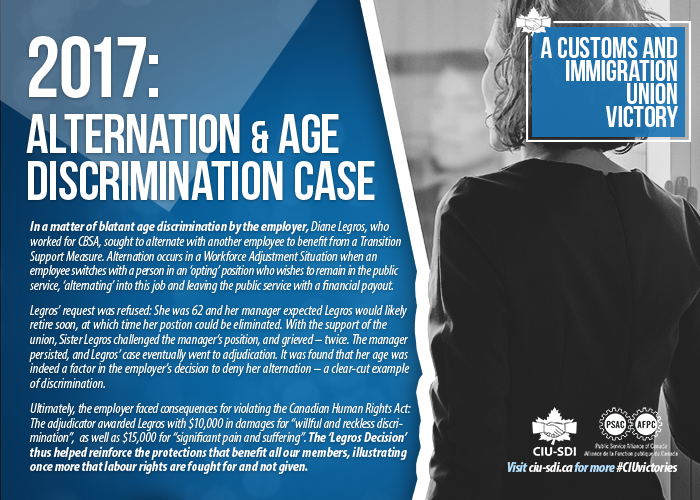PSAC welcomes the Supreme Court of Canada’s recent decision in the Fraser case, which reaffirms the obligation of employers to treat women equally and without discrimination – a protection guaranteed by section 15 of the Canadian Charter of Rights and Freedoms.
In 1997, the RCMP introduced a job-sharing program allowing up to three employees to split the duties of one full-time position as an alternative to unpaid leave. In practice, the program has been almost exclusively accessed by women seeking reduced working hours to take care of young children. However, job-sharing penalized women by not allowing participants to buy back their pensionable time, an option available to employees using other types of leave.
The Supreme Court has now ruled that this discrepancy is a violation of women’s Charter rights and has ordered the RCMP to provide a pension buy-back option for all employees who participated in job-sharing. More broadly, this decision is a reminder from the top court to employers across the country: all human resource programs and policies must promote equity and prevent discrimination against historically disadvantaged groups.
While the lawsuit was brought forward by three now-retired RCMP officers who were not union members, PSAC joined in support of their case as an intervener at the Supreme Court.
“PSAC thanks Joanne Fraser, Allison Pilgrim and Colleen Fox for their courage, and congratulates them on this important victory,” said Chris Aylward, PSAC National President. “Treating women equally means they should not be penalized when they take leave from work to care for their children. This win is another milestone in our union’s long history of work in support of gender equity.”
Here is a brief overview of PSAC’s decades-long work in support of women and child care:
-
- 1980s-1990s: With women at the forefront, tens of thousands of PSAC members launch a major strike in 1980 against Pierre Trudeau’s Liberal government that leads to groundbreaking paid maternity leave benefits, protecting mothers’ income while caring for their infants. These benefits eventually expand to include paid leave for both parents and full salary replacement for one year.
- 1989-1991: PSAC reaches an agreement with Treasury Board that a policy will be developed to encourage the establishment of workplace child care centres, open to both PSAC members as well as the general public.
- 1999: The union negotiates a special Child Care Fund to help members at Canada Post address their child care needs.
- 2004-2014: PSAC supports Fiona Johnstone, a member at the Canada Border Services Agency who requested accommodation for child care but was denied. In 2014, after a decade-long battle with her employer, the Federal Court of Appeals upheld a Canadian Human Rights Tribunal ruling that CBSA discriminated against Johnstone by failing to accommodate her family obligations related to child care. The precedent-setting Tribunal ruling must now be followed by all large employers in Canada.
- 2005: After more than a decade of advocacy by PSAC, the broader labour movement and women’s organizations, the federal government signs a series of child care funding agreements with provinces and territories, opening the way for a national child care system. A year later, however, the newly elected Harper Conservative government cancels all agreements.
- 2010-2020: In collaboration with other unions and child care organizations, PSAC ramps up advocacy in support of a publicly funded, national child care system. Campaigns include ‘Let’s Rethink Child Care!’, ‘Child Care 2020’, ‘You can’t take your kids to work’, and “Affordable Child Care for ALL.” Each involves intensive lobbying of federal politicians.
- 2020: PSAC files a policy grievance against Treasury Board regarding changes to its policy on the use of code 699 leave during the COVID-19 pandemic for childcare and caregiving responsibilities.
- 2020: In the midst of ongoing campaigning for a national child care program by the labour movement, Justin Trudeau’s government promises to “make a significant, long-term, sustained investment” towards a Canada-wide Early Learning and Child Care system. The plan will support millions of families across the country, promote a strong economic recovery and help prevent the pandemic from taking away the economic and social gains women have made over the last thirty years.
This article was first posted on the PSAC website.







